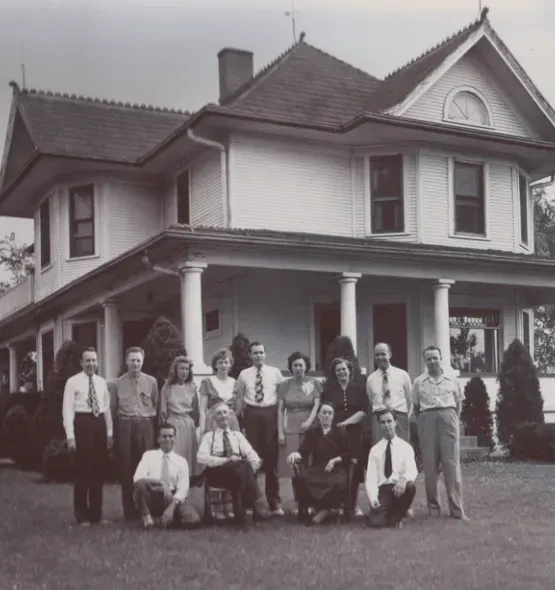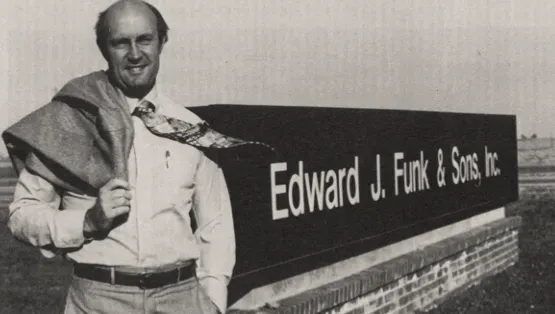COMMITMENT TO SEED QUALITY SINCE 1859
A MESSAGE FROM DAN FUNK
1859
More than 150 years ago, Barney Funk, my great, great grandfather, immigrated to America in order to farm. Fighting on the side of the Union Army in our great Civil War, Barney lived through the Battle of Chickamauga and for his service was rewarded an honorable discharge, 40 acres of land, a mule and 13 US dollars.

1877
Barney’s son, my great grandfather, Edward J. Funk, was born in 1877. Ed Funk was bright, industrious, Christian – and a man who worked from morning till night. Ed and his wife Jennie Funk had 11 children. The children worked as all farm children do. They sold to their neighbors live chickens, fresh eggs, homemade cheese, pork and beef, and boxed ears of open pollinated corn that Ed had saved from the previous year’s crop. They would always be told “don’t sell anything you would not eat or use on our own farm.”

1935
Ed and his sons founded a seed company – Edward J. Funk and Sons – with the goal to provide the best performing seed to their friends and neighbors. They raised the first crop of hybrid seed corn in the state of Indiana and soon expanded far across the Corn Belt.

1942
Ed’s sons were industrious. Among them, my great uncle Bernard was a sharp young businessman. My great uncle Carl was a member of Purdue University’s inaugural class to study corn hybridization. My grandfather Bill was a restless innovator who not only developed marketing programs still in use in the seed business today, but also created mechanical applications to spread liquid fertilizer, of which he was awarded multiple patents.

1957
As a young boy, my dad would visit his grandfather Ed at his farm. At sunset, they would sit on the side of the horse tank nearest the farmstead. Great Grandpa Ed would finish his workday with a cold beer but always had a Coca-Cola in a glass bottle for my dad. During this half hour, my grandfather Bill and my great uncles would also congregate to receive life lessons from Grandpa Ed. Life lessons around the horse tank! My dad heard my great grandfather tell them that you never sell anything you raise, be it animal or seed, that you would not consume or plant on your own farm.

1982
My father Don took over the family business, Edward J. Funk & Sons Incorporated, in 1975. He started his career in field and plant production so very early seed quality, warm and cold germination, genetic purity, self and off-type plants became an early passion and he lived and breathed to have the highest standards possible.

2023
Seed companies are tested most every year in their production. Sometimes we have wet and cold conditions early, sometimes it’s too hot or too cold mid-season, sometimes it’s too wet or dry later, or and sometimes strong winds, particularly in western production create significant challenges in hybrid corn and soybean seed production.
With these challenges, seed companies face the pivotal question of lowering the standards of the seed quality they produce in order to have what they deem necessary to sell the following season. Quite frankly, do they sell seed they would not plant on their own farms?
My guides to these questions remain the voices of my great grandfather Edward J. Funk, my grandfather Bill Funk, and my great uncles Bernard and Carl Funk. These voices remind me to stick to a standard of wanting less than 1% of off-type plants in a given seed lot. They continue to lead me to make the difficult decision to sometimes remove seed from our new crop inventory because it just won’t do.
Today’s seed industry has greatly evolved from when Great Grandpa Funk was raising and selling open-pollinated corn. While we embrace the dynamic present of row-crop farming, there is one thing that will never change for us – our commitment to Seed Quality. It’s a commitment we made at Funk, when we grew Channel into a leading national brand, and one in which we remain committed to today, at NC Plus. Because as Great Grandpa Ed always said:
“Don’t sell it if you wouldn’t plant it on your own farm.”

